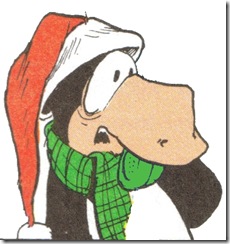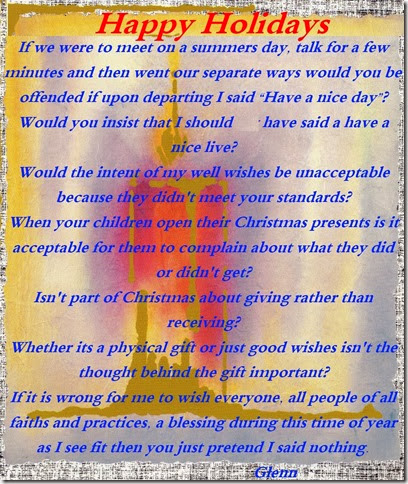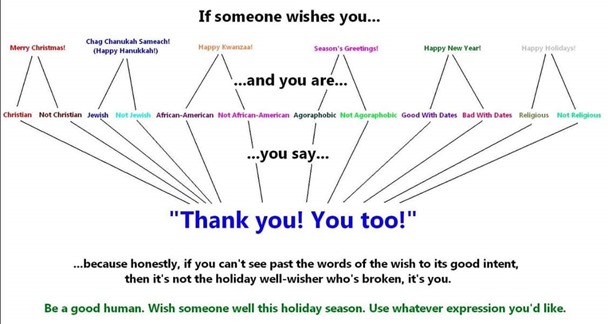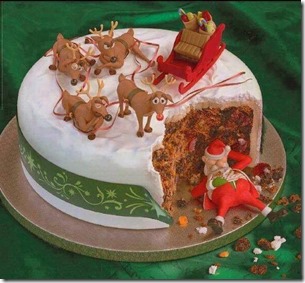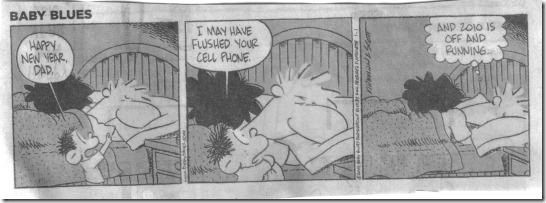part 5 of 8 by Glenn Littrell
Dec.26, Boxing Day:
The exact etymology of the term "boxing" is unclear. There are several competing theories, none of which is definitive. The European tradition, which has long included giving money and other gifts to those who were needy and in service positions, has been dated to the Middle Ages, but the exact origin is unknown. It may come from a custom in the late Roman/early Christian era, wherein metal boxes placed outside churches were used to collect special offerings tied to the Feast of Saint Stephen, which in the Western Church falls on the same day as Boxing Day.
In Britain, it was a custom for tradesmen to collect "Christmas boxes" of money or presents on the first weekday after Christmas as thanks for good service throughout the year. This is mentioned in Samuel Pepys' diary entry for 19 December 1663. This custom is linked to an older English tradition: Since they would have to wait on their masters on Christmas Day, the servants of the wealthy were allowed the next day to visit their families. The employers would give each servant a box to take home containing gifts and bonuses, and sometimes leftover food.
Boxing Day is also a time when the British show their true eccentricity taking part in all kinds of silly activities like swimming the English Channel - not the warmest place on December 26th - fun runs and charity events.
In modern times, it is an important day for sporting events and the start of the post-Christmas sales.
In Britain Alternative name 2nd day of Christmas.
Dec. 24, Boxing Day in Canada:
Boxing Day is a holiday in the United Kingdom and many countries (including Canada) that were once part of the British Empire. The origin of this holiday's name is not clear. In feudal times in the United Kingdom, the lord of the manor would 'pay' people who worked on his land in the past year with boxes practical goods, such as agricultural tools, food and cloth. These were often distributed on the day after Christmas Day. More recently, employers traditionally gave their servants a gift of money or food in a small box on the day after Christmas Day. Some people in Canada still give gifts to people who provide them with services.
Other stories relate to servants being allowed to take a portion of the food left over from the Christmas celebrations in a box to their families and the distribution of alms from the church collection boxes to poor parishioners. These traditions evolved into the Christmas baskets that some employers distribute to their employees during the holiday season at the end of the year.
Many people in Canada have a day off work and many of them visit stores that start their annual sales on Boxing Day. Some shoppers even start waiting outside stores in the small hours of the morning and many stores open earlier than usual. Now, the sales often last for a whole week between Christmas Day and New Year's Eve and are known as the "Boxing Week Sales" instead of the "Boxing Day Sales". In some areas, particularly in New Brunswick, Nova Scotia, Prince Edward Island, Newfoundland and Labrador and Ontario, stores are not open on Boxing Day and the post-Christmas sales start on December 27.
A number of important sporting events are held on Boxing Day and watching them on television is a popular activity. The International Ice Hockey Federation world junior hockey championships often start on December 26. The Canadian National team often does well in this event. The Spengler Cup ice hockey tournament, which is played in Davos, Switzerland, is also shown on major sports television channels. The Canada national men's team has performed well in this event in recent years.
Dec 26 (&27), St. Stephen's Day:
St. Stephen's Day, or the Feast of St. Stephen, is a Christian saint's day celebrated on 26 December in the Western Church and 27 December in the Eastern Church. Many Eastern Orthodox churches adhere to the Julian calendar and mark St. Stephen's Day on 27 December according to that calendar, which places it on 9 January of the Julian calendar used in secular contexts. It commemorates St. Stephen, the first Christian martyr or protomartyr. It is an official public holiday in Austria, Balearic Islands, Catalonia, Croatia, Czech Republic, Germany, Ireland, Italy, Luxembourg, Macedonia, Montenegro, Norway, Denmark, Estonia, Sweden, Finland, Romania, Serbia, Slovakia and Poland. The date is also a Public Holiday in those countries that celebrate Boxing Day on the day instead/as well.
In Ireland, the day is one of nine official public holidays.
In Irish, it is called Lá Fhéile Stiofán or Lá an Dreoilín, meaning the Day of the Wren or Wren's Day. When used in this context, "wren" is often pronounced "ran". This name alludes to several legends, including those found in Ireland, linking episodes in the life of Jesus to the wren. Although not as commonly practiced as previously, in certain parts of Ireland people carrying either an effigy of a wren or an actual caged wren (live or dead), travel from house to house playing music, singing and dancing. Depending on which region of the country, they are called wrenboys and mummers. A Mummer's Festival is held at this time every year in the village of New Inn, County Galway and Dingle in County Kerry. St. Stephen's Day is also a popular day for visiting family members.
Dec. 26 thru January 1st: Kwanzaa
Kwanzaa is an African American and Pan-African holiday which celebrates family, community and culture. Celebrated from 26 December thru 1 January, its origins are in the first harvest celebrations of Africa from which it takes its name. The name Kwanzaa is derived from the phrase "matunda ya kwanza" which means "first fruits" in Swahili, a Pan-African language which is the most widely spoken African language.
The first-fruits celebrations are recorded in African history as far back as ancient Egypt and Nubia and appear in ancient and modern times in other classical African civilizations such as Ashantiland and Yorubaland. These celebrations are also found in ancient and modern times among societies as large as empires (the Zulu or kingdoms (Swaziland) or smaller societies and groups like the Matabele, Thonga and Lovedu, all of southeastern Africa. Kwanzaa builds on the five fundamental activities of Continental African "first fruit" celebrations: ingathering; reverence; commemoration; re-commitment; and celebration.
Rooted in this ancient history and culture, Kwanzaa develops as a flourishing branch of the African American life and struggle as a recreated and expanded ancient tradition. Thus, it bears special characteristics only an African American holiday but also a Pan-African one, For it draws from the cultures of various African peoples, and is celebrated by millions of Africans throughout the world African community. Moreover, these various African peoples celebrate Kwanzaa because it speaks not only to African Americans in a special way, but also to Africans as a whole, in its stress on history, values, family, community and culture.
Kwanzaa was created to introduce and reinforce seven basic values of African culture which contribute to building and reinforcing family, community and culture among African American people as well as Africans throughout the world African community.
These values are called the Nguzo Saba which in Swahili means the Seven Principles.
1-(UNITY) --To Strive for and maintain unity in the family, community, nation and race.
2-KUJICHAGULIA (SELF DETERMINATION) --To define ourselves, names ourselves, create for ourselves and speak for ourselves rather than to allow others to do these things for us.
3-UJIMA (COLLECTIVE WORK AND RESPONSIBILITY) --To build and maintain our community together to make our sister and brothers' problems our problems and to solve them together.
4-UJAMAA (COOPERATIVE ECONOMICS) --To build and maintain our own stores, shops and other businesses and to profit from them together.
5-NIA (PURPOSE) --To make our collective vocation the building and developing of our community in order to restore our people to their traditional greatness.
6- KUUMBA (CREATIVITY) --To do always as much as we can, in the way we can, in order to leave our community more beautiful and beneficial than when we inherited it.
7- IMANI (FAITH) --To believe with all our hearts in our people, our parents, our teachers, our leaders and the righteousness and victory of our struggle.
While Kwanza has foundations and roots in culture and history back to ancient Egypt its origins as an African-American celebration originate in 1966 during the civil rights movement.
Kwanza emphasizes the giving of hand made crafted gifts. Gifts are given mainly to children, but must always include a book and a heritage symbol. The book is to emphasize the African value and tradition of learning stressed since ancient Egypt, and the heritage symbol to reaffirm and reinforce the African commitment to tradition and history.
$1.2 billion worth of candles, used in both Kwanzaa and Hanukkah celebrations, were shipped in 2008, according to the U.S. Census' Annual Survey of Manufacturers.
Dec. 26-29th:
26th – National Candy Cane Day
28th – National Chocolate Day
29th – National Chocolate Day
Dec. 26, National Whiner's Day
Didn't get what you wanted for Christmas? Did you eat one too many sugar cookies? Are there gifts overtaking your living space? Go ahead and complain. No, really, you can actually whine today; cheese is optional. The holiday is meant to be tongue-in-cheek.
Suggestions for Celebrating National Whiner's Day:
*Visit a shopping mall or retail store and watch people "whine" as they return and exchange their holiday
gifts (remember, it's not only the customers who whine).
*Invite friends over, or plan a party, and call it a "Whine and Geeze" party! Serve non-alcholic wine and
cheese!
*Again, invite friends to a National Whiner's Day party. In order to get in, your friends need to bring one
unwanted gift, wrapped, for a white elephant exchange.
Famous Celebrity Whiners over the last 20 years:
Kanye West
Chris Brown
Zsa Zsa Gabor
"Baghdad Bob," former Iraqi Information Minister, Mohammed Saeed al-Sahaf.
Sen. Jesse Helms, R. N.C.
Tammy Faye Bakker (Messner)
Dennis Rodman
Mike Tyson
Jerry Springer
Martha Stewart
Terrorist Osama bin Laden-The Taliban/al-Qaida
John Rocker-Atlanta Braves Pitcher
The Most Famous Celebrity Whiner's of the 20th Century:
Stan Laurel
Curly Joe
Jerry Lewis
Lucy Ball
Pee Wee Herman
Olive Oyle
Squiggy
Major Frank Burns
S.N.L. Whiner Family (Doug and Wendy Whiner)
Suggested/unproven origin:
Actually, the day was set aside for the opposite purpose, to encourage people to be grateful for what they have:
“In 1986 Rev. Kevin Zaborney designated December 26 as National Whiner’s Day. Zaborney founded the holiday in hopes of encouraging people to be thankful for what they have rather than unhappy about what they don’t have. Suggestions for celebrating National Whiner’s Day include visiting a mall or store to watch people whine as they return or exchange unwanted gifts, inviting friends over for a ‘Whine and Geeze’ party, and holding a whining contest with family and friends.’
Dec 26, National Thank You Note Day
While you're being grateful, be thankful. Skip the text messages and the Facebook posting, send a real thank you card in the mail. Thank friends and family members for gifts, whether you liked them or not. At the very least, the U.S. Postal Service will thank you.
Emily Post's etiquette tips on thank you notes:
* Handwritten notes are more personal than phone calls or emails
* Write thank you notes for holiday gifts within two or three days of receiving them
*While you’re being grateful, send a thank-you note to folks who gave you gifts this year. It’s also Thank-You Note Day.
According to Oprah’s website, "Experts say not to underestimate the power of a thank you... People really appreciate getting mail that's not a bill, for one thing, and just taking that extra bit of time to write a thank you note really means everything."
If you have children, there's no better time than now to get them into the habit of writing thank you notes to send out for the gifts they received for the holidays. It's a great way for them to express their thankfulness in a gracious manner.
Dec. 27, 2nd Day of Kwanza
Dec. 28, Holy Innocents Day:
The Massacre of the Innocents is the biblical narrative of infanticide and gendercide by Herod the Great, the Roman appointed King of the Jews. The historicity of the incident is "an open question that probably can never be definitively decided", but according to the Gospel of Matthew, Herod ordered the execution of all young male children in the village of Bethlehem, so as to avoid the loss of his throne to a newborn King of the Jews whose birth had been announced to him by the Magi. In typical Matthean style it is understood as the fulfillment of an Old Testament prophecy:
"Then was fulfilled that which was spoken through Jeremiah the prophet, saying, A voice was heard in Ramah, Weeping and great mourning, Rachel weeping for her children.
The number of infants killed is not stated, however the Holy Innocents have been claimed as the first Christian martyrs.
In Matthew's account, magi from the east go to Judea in search of the newborn king of the Jews, having "seen his star in the east". The King, Herod the Great, directs them to Bethlehem, and asks them to let him know who this king is when they find him. They find Jesus and honor him, but an angel tells them not to alert Herod, and they return home by another way.
The Massacre of the Innocents is at Matthew 2:16–18, although the preceding verses form the context:
When [the Magi] had gone, an angel of the Lord appeared to Joseph in a dream. Get up, he said, take the child and his mother and escape to Egypt. Stay there until I tell you, for Herod is going to search for the child to kill him. So he got up, took the child and his mother during the night and left for Egypt, where he stayed until the death of Herod. And so was fulfilled what the Lord had said through the prophet: "Out of Egypt I called my son." When Herod realized that he had been outwitted by the Magi, he was furious, and he gave orders to kill all the boys in Bethlehem and its vicinity who were two years old and under, in accordance with the time he had learned from the Magi. Then what was said through the prophet Jeremiah was fulfilled: "A voice is heard in Ramah, weeping and great mourning, Rachel weeping for her children and refusing to be comforted, because they are no more."
Dec. 29, 3rd Day of Kwanza
Dec. 30, 4th Day of Kwanza
Dec 31, Leap Second Time Adjustment Day:
What are leap seconds?
 They last only a heartbeat and go unnoticed by most - but without leap seconds our clocks would run too fast.
They last only a heartbeat and go unnoticed by most - but without leap seconds our clocks would run too fast.
About every one and a half years, one extra second is added to Universal Coordinated Time (UTC) and clocks around the world. This leap second accounts for the fact that the Earth's rotation around its own axis, which determines the length of a day, slows down over time while the atomic clocks we use to measure time tick away at almost the same speed over millions of years.
So, leap seconds are a means to adjust our clocks to the Earth's slowing rotation.
There is no adjustment currently schedule for today (Dec 31, 2012) or June 30, 2013. gdl
Dec 31, World Peace and Meditation Day:
At noon Greenwich time, December 31, 1986, men, women, and children around the world gather to participate in the most comprehensive prayer activity in the history-- a planetary affirmation of peace, and love, forgiveness and understanding involving millions of people in a simultaneous global mind link. the purpose: to reverse the polarity of the negative force field in the race of mind, achieve a critical mass of spiritual consciousness, and usher in a new era of Peace on Earth.
It was called World Healing Day, the World Instant of Cooperation, World Peace Day-- a moment of Oneness to dissolve the sense of separation and return human kind to Godkind. Whatever the term or label, it was the New Beginning in restoring this world to sanity.
The majority of individuals and organizations participating were operating under the umbrella of the Planetary Commission, a world wide non-denominational, non-political movement functioning as an extension of The Quartus Foundation. It was a grass roots cooperative effort to unite people in a common bond of love and bringing our planet back into balance.
28 / 61 / 155




